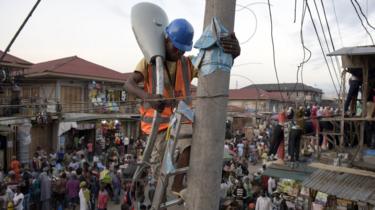 AFP
AFP
When President Muhammadu Buhari took over power in May 2015, many Nigerians expected him to wave a wand and bring about change.
Adaobi Tricia Nwaubani writes from Abuja.
:They felt that their votes had hired the right man who would immediately fix all that was wrong with our country.
:They felt that their votes had hired the right man who would immediately fix all that was wrong with our country.
But, while delivering a speech to commemorate Nigeria's 55 years of independence from the UK on 1 October, President Buhari made it clear that he would not do the job on his own.
He invited every Nigerian to share the burden of change with him: "We all have a part to play to bring about change.
"We must change our lawless habits... We must change our unruly behaviour... To bring about change, we must change ourselves."
 Reuters
Reuters
Few of us who live in Nigeria can deny knowledge of exactly what our president was talking about.
We are quite familiar with ubiquitous unruly behaviour:
- The Nigerians who will never stand in any queue, who must make their way to the front as soon as they arrive
- The drivers who will never stop at a traffic light, who consider it anathema to allow an empty space in front of their vehicles
- The invisible individuals who excrete piles of solid waste on the pavements, night after night
- The staff who take three weeks' leave to attend their father's burial, then another three weeks later in the year to attend their father's burial, again. "That first one was my father who paid my school fees," they say. "This one is my biological father"
- The mothers who threaten the head teacher with fire and brimstone because their children were punished for coming late to school
- The bosses who, in the presence of their entire staff, praise you for your excellent work skills, then wink and ask if you also have excellent "bedroom skills", while everyone present bursts out laughing
- The top government officials who show off their importance by the number of people jam-packed into their waiting rooms. They give you an appointment for 7am, knowing full well that they do not intend to see you until 10pm
- The air hostesses who frown throughout the flight, to avoid giving you the false impression that they are at your beck and call
- The "big men" and "big women" who scream "Do you know who I am?" when you ask for some identity before they can be allowed through the gate
- Those who ring the airline to request that the flight be delayed for their sakes, while their fellow passengers gaze out of the aeroplane windows for an hour, wondering why the flight is delayed, this time
I could go on and on. The catalogue of unruly behaviour in Nigeria is endless.
And, like President Buhari has pointed out, for the country to move forward, these bad habits have to change.
Adaobi Tricia Nwaubani:
 AFP
AFP
"Times have changed... Doling out instant corporal punishment in public with soldiers both administering and executing justice goes against the country's constitution"
But change will require more than passionate appeals from revered leaders.
For many Nigerians, unruly behaviour has become ingrained. It is now a case of "I know it, but I just can't help it".
Back in 1983, when he took over power in a military coup, President Buhari enforced his "War Against Indiscipline" (WAI) with the help of armed personnel, who punished unruly behaviour with instant penalties, such as frog jumps in the street.
WAI worked. Nigerians began to behave themselves.
 AFP
AFP
But times have changed. Today's Nigeria is a democracy. Doling out instant corporal punishment in public with soldiers both administering and executing justice goes against the country's constitution.
A good place to start would be to understand the origin of this unruly behaviour.
Would you do this in London?
The same Nigerians who find it impossible to queue up at the Murtala Muhammed Airport in Lagos immediately stand in line when they arrive at Heathrow.
And you are unlikely to hear a Nigerian "big man" barking "Do you know who I am?" to a cleaner on the streets of London.
He knows that he could easily end up spending the night in jail.
 AFP
AFP Getty Images
Getty Images
My father once told me how anyone who defecated in public was punished back when he was growing up.
The pile of excreta would be set alight, and a generous quantity of red pepper added to the flames.
Doing this was believed to cause the culprit's anus to begin to burn and itch wherever he was. And this belief acted as deterrent against people defecating in public places.
In today's Nigeria, where weak modern institutions have replaced traditional checks and balances, hardly any deterrents against lawlessness exist.
People have become used to getting away with almost anything. Many Nigerians consider themselves a law unto themselves.
But, anything is possible. President Buhari wants Nigerians to change and change we can.
After all, the Europeans who berthed on Africa's shores in the colonial era were able to replace entire peoples' habits with completely new and different ways.
Muhammadu Buhari at a glance:
 AFP
AFP- The 72-year-old is first Nigerian opposition candidate to win a presidential election
- Military ruler of Nigeria from 1984 to 1985 until deposed in a coup
- Poor human rights record during that time and a disciplinarian - civil servants late for work had to do frog jumps
- A Muslim from northern Nigeria, he is seen as incorruptible

No comments:
Post a Comment